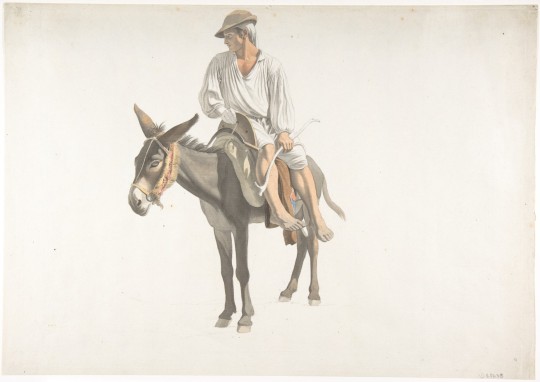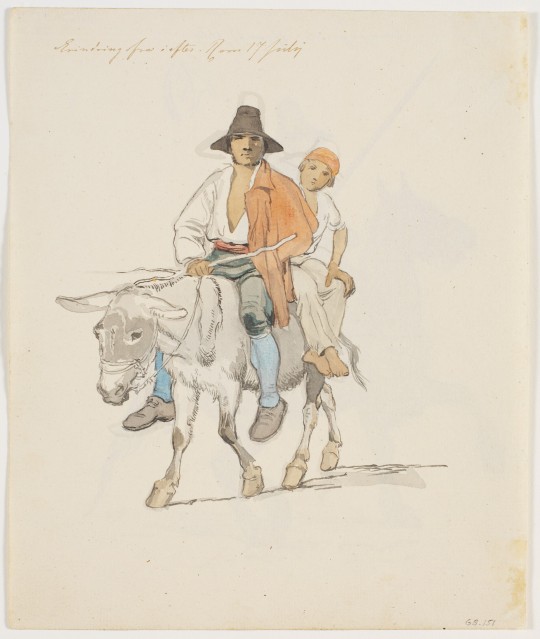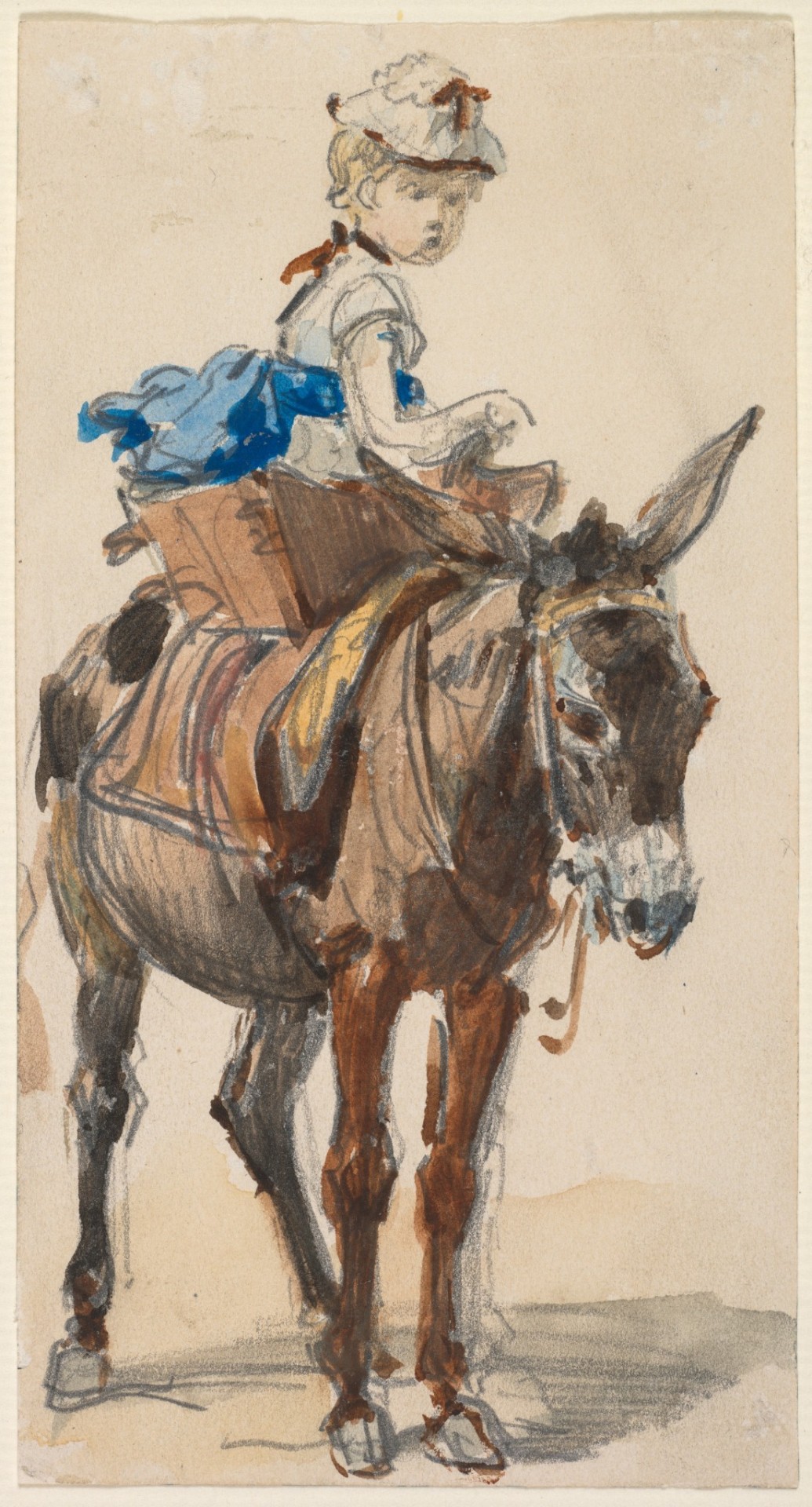#Giovanni Battista Lusieri
Explore tagged Tumblr posts
Text



Giovanni Battista ("Titta") Lusieri, Peasant on a Donkey, ca. 1783-1787, Metropolitan Museum of Art.
Johan Thomas Lundbye, En italiensk bonde med hans søn, siddende på et æsel, 1846, Statens Museum for Kunst, open.smk.dk, public domain.
Isidore Pills, Girl on a Donkey, 19th century, Cleavland Museum of art.
(Picture source for Peasant on a Donkey, En italiensk bonde med hans søn, siddende på et æsel, and Girl on a Donkey)
#Giovanni Battista (“Titta”) Lusieri#Giovanni Battista Lusieri#the metropolitan museum of art#met#1700s art#18th century art#donkey#donkeys#art#art history#equine art#watercolour over graphite#watercolour#graphite#smk#danish national gallery#cleavland museum of art#19th century art#1800s art
49 notes
·
View notes
Text

The Monument to Philopappos, Athens by Giovanni Battista Lusieri (1805)
92 notes
·
View notes
Photo

Giovanni Battista Lusieri
The Monument to Philopappos, Athens. about 1805-1807
Scottish National Gallery, Edinburgh
625 notes
·
View notes
Text

Giovanni Battista Lusieri (Italian, 1755-1821), Panoramic view of Rome from Piazza San Pietro in Montorio on the Janiculum: From Saint Peter's to the Chiesa Nuova with San Giovanni dei Fiorentini and Castel Sant' Angelo, pencil, pen and brown ink and watercolour, 21½ x 36¾ in. (54.5 x 93.5 cm.) [source: Christies]
14 notes
·
View notes
Photo

Night view of the eruption of Vesuvius, by Giovanni Battista Lusieri (1751-1821), watercolour on paper. (Artfix Daily)
56 notes
·
View notes
Photo

Giovanni Battista Lusieri (Italian, ca. 1755-1821) - A Greek Double Urn, Watercolour over pencil on paper, 26.10 x 30.20 cm, about 1804
https://www.nationalgalleries.org/art-and-artists/14754/greek-double-urn
62 notes
·
View notes
Photo

Giovanni Battista Lusieri - The Monument to Philopappos, Athens (1805)
460 notes
·
View notes
Text
The great pillaging of Greek artifacts in the beginning of 19th century.
The two decades before the Greek liberation struggle was the period of great pillage of antiquities, including the Greek ones, and the period when the great European museums were founded or enriched (Vatican 1792, British 1753, Louvre 1801, Munich 1830).
To the British Museum were transferred: From the Acropolis of Athens (Lord Elgin,1801-05). Parthenon sculptures (pediments, 56 frieze plates, 15 fronts). The frieze of the Temple of Athena Nike, a caryatid of Erechtheion.
To Munich in 1811: Sculptures from Aphaia's Temple of Aigina
To the British Museum in 1812: From the temple of Apollo to the Vasses of Figalea.
From the letters of Giovanni Battista Lusieri to Lord Elgin:
4th October 1802:
“I do everything I can to increase your collection, my lord. I got permission from the Turk garrison commander to download a Doric capitol from the Parthenon but I have to saw it in two. If the other one is big, that's huge. The castle doors are not big enough for it to pass.”
5th January 1802
“I will continue the excavations with the utmost fervor in the Temple of Athena and continue to saw the reliefs. It's a time-consuming task. If it is not possible to have all the complex of Pandrosos, I have hope for one of the Caryatids.”
________________________________________________________________
Οι μεγάλες λεηλασίες των αρχών του δεκάτου ένατου αιώνα.
Οι δυο δεκαετίες πριν από τον απελευθερωτικό αγώνα υπήρξαν η περίοδος των μεγάλων λεηλασιών των αρχαιοτήτων, συμπεριλαμβανόμενων των Ελληνικών, και η περίοδος που ιδρύθηκαν ή εμπλουτίστηκαν τα μεγάλα Ευρωπαϊκά μουσεία (Βατικανού 1792, Βρετανικό 1753, Λούβρο 1801, Μονάχου 1830)
Στο Βρετανικό μουσείο πήγαν κλοπιμαία από: Ακρόπολη Αθηνών (Λόρδος Έλγιν, 1801-05). Γλυπτά του Παρθενώνα (αετώματα, 56 πλάκες της ζωοφόρου, 15 μετώπες). Ζωοφόρος του Ναού της Αθηνάς Νίκης, μια καρυάτιδα του Ερεχεθείου.
Στο Μονάχο το 1811: Γλυπτά του ναού της Αφαίας της Αίγινας
Στο Βρετανικό Μουσείο το 1812: Από ναό Απόλλωνος στις Βάσσες Φιγαλείας.
Από τις επιστολές του Τζοβάνι Μπατίστα Λουζιέρι στο Λόρδο Έλγιν:
4 Οκτωβρίου 1802
«Κάνω ό,τι μπορώ για να αυξήσω τη συλλογή σας, Μιλόρδε. Πήρα την ��δεια του δισδάρη* να κατεβάσω ένα δωρικό κιονόκρανο από τον Παρθενώνα, αλλά πρέπει να το πριονίσω στα δύο. Αν το άλλο είναι μεγάλο, αυτό είναι τεράστιο. Οι πόρτες του κάστρου δεν είναι τόσο μεγάλες για να χωρέσει να περάσει».
*Στην περίοδο της Τουρκοκρατίας ο φρουράρχης, ειδικότερα Τούρκος φρούραρχος της Αθήνας
5 Ιανουαρίου 1802
«Θα συνεχίσω τις ανασκαφές με την πιο μεγάλη θέρμη στο Ναό της Αθηνάς και θα συνεχίσω να πριονίζω τα ανάγλυφα. Είναι μια εργασία που απαιτεί χρόνο. Σε περίπτωση που δεν είναι δυνατόν να έχουμε το σύνολο της Πανδρόσου, εγώ δεν απελπίζομαι για μια από τις Καρυάτιδες».
_____________________________________________________________
I must thank @xaosistoria for the passages!
#ΗΕ SAYS HE TOOK THE PERMISSION OF THE TURKS#maybe the local turkish managment idk#HE ALSO SAWED ALL THIS MARBLE LIKE IT WAS A PIECE OF MEAT#what a fucker#antiquity theft#elgin#parthenon marbles
68 notes
·
View notes
Text

GIOVANNI BATTISTA LUSIERI (ROME 1754-1821 ATHENS) A view of the Tiber Valley towards the North from Monte Mario signed ‘Titta f.’ (lower left, on the mount) graphite, pen and black ink, watercolour, watermark ‘J HONIG/ &/ ZOONEN’ 58.9 x 96.4 cm (223/4 x 37 in.)
1 note
·
View note
Photo




Open now: “Italian Light on English Walls: Artists and the Grand Tour in Italy.”
Nine rarely exhibited works on paper, drawn from The Huntington’s permanent collections, reveal the great variety of Grand Tour imagery and the many reasons artists flocked to Italy in the 18th century. Whether seeking commissions, accompanying young aristocrats on their travels, or furthering their own artistic education, these works represent a generation of great British artists who played an important role in visually documenting the Grand Tour.
See it on view now through July 9th, in the Works on Paper Room in the Huntington Art Gallery.
images:
John Robert Cozens (British, 1752-1799), Rome from the Villa Madama, undated, watercolor, Gilbert Davis Collection. The Huntington Library, Art Collections, and Botanical Gardens.
Giovanni Battista Lusieri (Italian, 1755-1821), Rome from the Tiber, undated, pen and watercolor.The Huntington Library, Art Collections, and Botanical Gardens.
William Pars (British, 1742-1782), Civita Lavinia, undated, pencil and watercolor, Gilbert Davis Collection.The Huntington Library, Art Collections, and Botanical Gardens.
George Cooper (British, active 1792-1830), Pantheon, undated, watercolor, Gilbert Davis Collection. The Huntington Library, Art Collections, and Botanical Gardens.
71 notes
·
View notes
Photo

Giovanni Battista Lusieri (Italian, 1755-1821), Rome from the Tiber, undated, pen and watercolor.The Huntington Library, Art Collections, and Botanical Gardens.
1 note
·
View note
Photo

Peasant on a Donkey by Giovanni Battista Lusieri, Drawings and Prints
Medium: Watercolor, over graphite.
Rogers Fund, 1966 Metropolitan Museum of Art, New York, NY
http://www.metmuseum.org/art/collection/search/340706
2 notes
·
View notes
Photo

Giovanni Battista Lusieri, View of the Bay of Naples 1791
1 note
·
View note
Photo

Giovanni Battista Lusieri - The South-east Corner of the Parthenon, Athens (1803)
252 notes
·
View notes
Photo

Swipe left to see the details in this painting of the bay of Naples Italy by Giovanni Battista Lusieri #art #painting #gettymuseum #18century #oilpainting #naples (at The J. Paul Getty Museum)
0 notes


